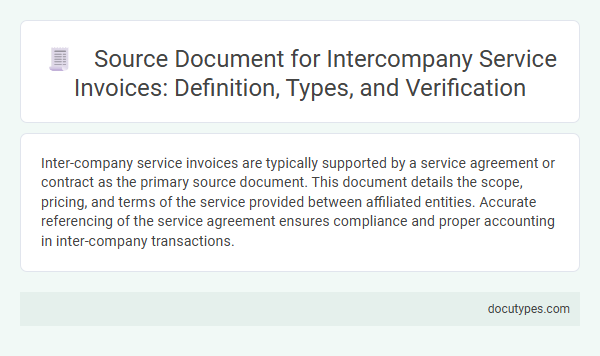Inter-company service invoices are typically supported by a service agreement or contract as the primary source document. This document details the scope, pricing, and terms of the service provided between affiliated entities. Accurate referencing of the service agreement ensures compliance and proper accounting in inter-company transactions.
Introduction to Source Documents for Intercompany Service Invoices
Source documents play a crucial role in the processing of inter-company service invoices by serving as verification and authorization tools. These documents ensure accuracy and compliance within intercompany transactions.
- Intercompany Service Agreement - Defines the terms, scope, and pricing of services exchanged between entities within the same corporate group.
- Service Delivery Report - Provides evidence of the services rendered, including details such as dates, hours, and deliverables.
- Intercompany Invoice - Acts as the official billing document issued from one entity to another for services provided, referencing the associated agreements and reports.
Definition of Source Document in Intercompany Transactions
A source document in inter-company service invoices is a critical record that supports the transaction details between related entities. It ensures accuracy and traceability in financial reporting for intercompany services provided.
- Definition of Source Document - A source document is the original record capturing the essential data of an intercompany service transaction.
- Role in Intercompany Transactions - It serves as legal proof and audit trail for charges billed and services rendered between affiliated companies.
- Common Examples - Service agreements, work orders, and internal billing statements act as typical source documents for intercompany invoices.
Understanding the source document helps you maintain compliance and improves the reliability of inter-company invoicing processes.
Importance of Source Documents in Intercompany Invoicing
A source document for inter-company service invoices typically includes a detailed service agreement or internal work order that outlines the scope and terms of services rendered. Accurate source documents are crucial for ensuring transparent billing, verification, and compliance between affiliated entities within a corporation. Your ability to maintain precise records helps streamline auditing processes and supports financial accuracy across company divisions.
Key Components of Source Documents for Service Invoices
What source document is used for inter-company service invoices? The primary source document for inter-company service invoices is the service agreement or contract that outlines the terms of services provided between entities. These documents ensure accurate billing by detailing the scope, price, and delivery dates of the services rendered.
What are the key components of source documents for service invoices? Key components include the service description, date of service, billing amount, service provider and recipient information, and payment terms. Proper inclusion of these elements in your source documents facilitates transparent and efficient inter-company transactions.
Common Types of Source Documents for Intercompany Services
Source documents for inter-company service invoices serve as the primary records validating transactions between affiliated entities within the same corporate group. These documents provide detailed evidence of services rendered, ensuring accuracy and compliance in intercompany billing processes.
Common types of source documents for intercompany services include service agreements, purchase orders, and timesheets. Additionally, delivery receipts and internal memos often support the validation of service transactions in corporate accounting systems.
How to Prepare Source Documents for Intercompany Service Invoices
| Topic | Details |
|---|---|
| Source Document for Inter-company Service Invoices | Inter-company service invoices are typically supported by Service Agreement Records and Internal Work Orders that detail the nature of services exchanged between entities within the same corporate group. |
| Purpose of Source Documents | The source documents validate the charges applied across entities, ensuring accuracy in billing and compliance with internal accounting policies. |
| How to Prepare Source Documents | Begin by clearly defining the scope and terms of the services provided in a formal Service Agreement. Document every service transaction using Internal Work Orders or detailed logs capturing date, type of service, quantity, and responsible units. Ensure that approvals are secured from authorized personnel to establish legitimacy. Maintain these records systematically to facilitate seamless invoice generation and auditing processes. |
| Your Role | You must ensure that all service details are accurately documented and verified before invoicing to promote transparency and reduce reconciliation issues between inter-company accounts. |
Verification Procedures for Intercompany Service Source Documents
Inter-company service invoices are typically supported by service agreements or contracts outlining the scope and terms of services rendered between entities. These source documents provide essential details such as service description, billing rates, and approval signatures to ensure transaction validity.
Verification procedures for intercompany service source documents include cross-referencing service agreements with invoice details to confirm consistency. Auditors perform checks on authorization, completeness, and accuracy to validate that invoiced services match contracted terms and actual delivery records.
Compliance and Audit Requirements for Intercompany Source Documents
The source document used for inter-company service invoices is typically an intercompany service agreement or a detailed service report. This document must clearly outline the services provided, pricing, and approval signatures to ensure accuracy and traceability.
Compliance and audit requirements for intercompany source documents emphasize proper documentation, authorization, and consistency with transfer pricing regulations. Maintaining detailed records is essential to support the legitimacy of transactions during audits. You should ensure that these documents are securely stored and readily accessible for internal and external reviews.
Challenges in Managing Intercompany Service Invoice Documentation
Managing inter-company service invoice documentation involves complex coordination between multiple business entities. Source documents play a crucial role in ensuring accuracy and compliance across intercompany transactions.
- Source Document Identification - The primary source document used for inter-company service invoices is the intercompany service agreement, detailing the scope and terms of services provided.
- Documentation Accuracy - Ensuring accurate recording of service details on invoices is challenging due to varying internal systems and standards across different company units.
- Compliance and Audit Trails - Maintaining comprehensive audit trails for intercompany invoices is essential for regulatory compliance and minimizing discrepancies in financial reporting.
What Source Document Is Used for Inter-company Service Invoices? Infographic

